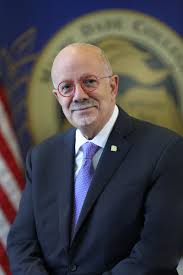You have /5 articles left.
Sign up for a free account or log in.
Community colleges have evolved over the past few decades from institutions that rarely focused on their relationships to local economies to being seen as economic engines capable of producing new generations of skilled workers to meet the demands of local and regional labor markets.
Two nationally known community college presidents, one in Miami and the other in New York, have been at the forefront of that change by calling for a higher education system that, among other things, is more racially equitable, that closes achievement gaps and is more affordable and accessible to low-income students.
Now, after more than five decades between them of leading the way, they are both stepping down.
 Miami Dade College president Eduardo Padrón (at right) announced earlier this month that he would retire in August. LaGuardia Community College president Gail Mellow announced Wednesday that she would also step down in August.
Miami Dade College president Eduardo Padrón (at right) announced earlier this month that he would retire in August. LaGuardia Community College president Gail Mellow announced Wednesday that she would also step down in August.
"It was a tough decision, honestly, and it’s been such an honor and a privilege to be part of this incredible institution for so long and to watch it change,” Mellow said in an exclusive interview with Inside Higher Ed. “I think of myself as a steward of the institution. I didn’t start it. I won’t end it. I have the strongest senior leadership team I’ve ever had, and one key responsibility of any president is to ensure they have people better and stronger than themselves who will take the initiatives begun under one president and move them forward. I see that in my senior staff.”
Under Mellow’s 20-year tenure, LaGuardia, which is part of the City University of New York system, has grown enrollment by about 40 percent to more than 57,000 students. The number of faculty members also more than doubled, to nearly 1,100 full- and part-time instructors, and the percentage of faculty of color climbed from 31 percent to 44 percent.
“Community colleges were virtually invisible when I began as a professor right out of graduate school,” she said. “I remember the first time I heard a president address a community college in a State of the Union address. I believe it was George W. Bush. We have moved so far, and I think that’s because of myself and my colleagues who have really talked about an equity agenda in higher education, an innovation agenda and a cost agenda.”
Padrón, who attended Miami Dade as a student, has been connected to the college for more than 50 years and spent the past 24 years as the institution’s president. The college grew into one of the most prominent and largest two-year institutions in the country under his watch and now has an enrollment of about 100,000 students. The total enrollment was 47,060 in fall 1995, the same year he became president.
“I have been profoundly honored to serve as chairman of the Board of Trustees during Dr. Padrón’s tenure,” board chair Bernie Navarro said in a news release announcing Padrón's retirement. “He has truly left an indelible mark on the college, community and nation with an unparalleled and impeccable career of service with integrity, passion, dignity, humanity and empathy.”
Padrón said the United States remaining a major economic power depends on community colleges’ ability to prepare students for the work force.
“We should be ensuring that every American has an opportunity to get an education,” he said during an interview last week at the national conference for Achieving the Dream, an organization that promotes student success. “We’re doing America’s work giving every student a chance to access new jobs.”
Karen Stout, executive director of Achieving the Dream, said Padrón built Miami Dade into much more than a community college.
“He’s been a champion of equitable student outcomes [since] before we even started talking about equity,” she said. “He’s shaped industry partnerships … he’s not just a national community college leader but an international educator.”
President Obama awarded Padrón the Presidential Medal of Freedom, the nation’s highest civilian honor, in 2016 for his advocacy for students of color and for creating equitable and affordable college pathways.
Padrón may be stepping down soon, but he doesn't plan to stop thinking about how to improve higher education and innovate teaching. He said making education more racially equitable so more students of color can graduate, and reforming teaching practices, should be the next priorities of community colleges.
Community colleges have spent years reforming student affairs practices, Padrón said. “We haven’t put the same emphasis on the faculty side. What about pedagogy? That’s the side we need to put an emphasis on.”
Mellow has been among community college leaders calling for two-year faculty members to examine their teaching methods to determine if they're actually helping students learn and to reform those methods that aren't effective so they can better help students succeed and graduate. She co-authored a book in 2015 that sought to help faculty examine and improve their teaching practices.
“Gail has been out front on a number of issues,” Stout said. “She doesn’t shy away from taking a position on new ideas, and she doesn’t shy away from asking tough questions of colleagues … She put a lot of time and attention on faculty and pedagogy, and that's a unique voice for community colleges.”
Mellow, for example, was one of the first community college presidents to advocate for tuition-free college, as was Padrón. Both presidents serve on President Obama's America's College Promise board, which is now called the College Promise Campaign and works to increase the number of free community college programs across the country.
Stout said despite Mellow's and Padrón's impressive résumés and national profiles as leaders in community college reform, they always remained accessible to students.
“As much as they are out speaking nationally, they attend to students on their campuses and create a sense of belonging, which is such an art for presidential leaders,” she said.
Mellow and Padrón were both instrumental in increasing work-force partnerships between their institutions and local employers, which helped students transition from college to careers. Mellow said such working relationships with business leaders weren’t always considered an important mandate of community colleges 20 years ago.
LaGuardia, for example, has a partnership with the New York City Economic Development Corporation to help create 10,000 cybersecurity jobs. And although the deal between New York City and Amazon to build a second headquarters in Queens fell apart, LaGuardia was part of the proposal to recruit the company. Miami Dade, meanwhile, became the first college in Florida to partner with Facebook to offer students a digital marketing certificate last year.
Mellow said she wants community colleges to be recognized for their broad mission and not be seen as strictly as institutions that build pipelines to technical and work-force careers.
“This is a danger in pigeonholing community colleges as technical trainers but not more than that,” she said. “I’m proud that LaGuardia has more philosophy majors than probably any college on the East Coast. It’s critical that we remain vibrant in the range of human intellectual endeavor. That’s how you create a sustained middle class and an entrepreneurial class and a gateway for low-income individuals to come in and make a difference to their communities, states and the world.”








